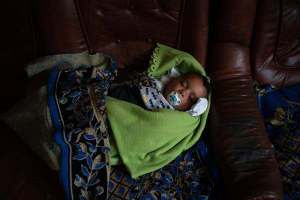During 2019, Americans watched in horror as children of all ages were forcibly separated from their parents at the U.S.-Mexico border. While much of the early 2020 news coverage has now turned away from this abhorrent treatment of families along our southern border, Nurturely is committed to ensuring that ALL babies have the ability to thrive. Therefore, Nurturely will continue to call attention to the ongoing humanitarian crisis at our border detention facilities. Nurturely strongly condemns the cruel family separations at the U.S.-Mexico border as well as the intolerable conditions of migrant detention camps.
The youngest baby separated from family at the US-Mexico border was four months old
Decades of research show that childhood trauma, especially in infancy, can create lasting long term physiological and psychological damage. The trauma of separation, as well as detention with congregate care (24-hour residential facilities for groups of children), does not the support healthy brain development. Congregate care prevents the child from bonding with caregivers. There have been reports of harsh conditions without basic provisions at border detention facilities. Children in these centers have already been screened to display “developmental delays and signs of emotional disturbance such as a short attention span, aggression, withdrawal, difficulty coping, and learning difficulties” (Zero to Three). The detrimental effects of stress cannot be buffered by familial connections in these detention settings; the only safe placement is in a family-like setting.
Short term effects on children of forced parental separation and placement in incarceration-like settings include:
- Anxiety
- Depression
- Self-regulatory issues (such as sleeplessness or eating issues).
Longer-term consequences of these traumatic experiences include:
- Behavior and cognition regression
- Symptoms of post-traumatic stress disorder (PTSD).
- When not addressed by a medical professional, these childhood traumas can lead to:
- Increased risk for learning difficulties
- Problems forming relationships
- Adult health issues.
Given this compelling research, Nurturely actively advocates for the following policy changes:
- Families who have been separated should be reunified immediately and the practice of separation stopped. While the Executive claims that this practice has stopped, it is unclear if this is true.
- Young children who have been held in detention and/or separated from families should immediately receive mental health services and support. It should be presumed that children who have experienced detention and/or separation have experienced life- changing trauma and are treated accordingly.’
About the author: India Olchefske, MPH, has a Master’s in Public Health from George Washington University and a Bachelor’s from the University of Chicago. Her graduate thesis focused on how the opioid epidemic affects rural pregnant women. She has worked at a variety of direct service, research and policy organizations with a focus on women’s and maternal health. She is currently pursuing a career as a ballet dancer in addition to public health.
